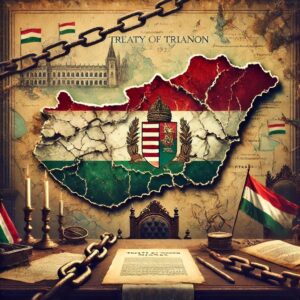In June 1920, Hungary faced a moment that would forever alter its place in the world: the signing of the Treaty of Trianon. This treaty, a component of the broader peace settlement concluding World War I, was one of the most significant turning points in Hungarian history. Stripped of two-thirds of its territory and over half its population, Hungary emerged from the treaty a shadow of its former self, sparking decades of national reflection, cultural resilience, and political tension.
Hungary’s pre-war borders included vast lands and a diverse population. Trianon reduced the nation from over 325,000 square kilometers to just 93,000 square kilometers. Entire regions, such as Transylvania, Slovakia, and Croatia, were ceded to neighboring states like Romania, Czechoslovakia, and Yugoslavia. For millions of ethnic Hungarians, this meant waking up one day as minorities in foreign countries—a deeply personal and painful transformation.
Economically, Hungary’s once-thriving industries, heavily reliant on resources from the lost territories, crumbled. Railways now crossed international borders, agriculture lost fertile lands, and trade routes were disrupted. The psychological impact was equally severe, with national pride and identity deeply wounded.
The treaty’s fairness remains a topic of debate. To the Allied powers, it was a necessary measure to weaken a defeated empire and ensure stability in the region. To Hungary, it felt punitive and excessive, fostering a sense of injustice that would linger for generations. This resentment became fertile ground for political instability, influencing Hungary’s role in the interwar years and even its alignment during World War II.
Despite the losses, Hungary preserved its cultural heritage. The arts, literature, and traditions flourished as Hungarians sought solace and strength in their shared identity. Writers like Dezső Kosztolányi and musicians such as Béla Bartók emerged as symbols of resilience, capturing the spirit of a nation determined to rise above adversity.
More than a century later, the Treaty of Trianon is still a sensitive topic in Hungary. It shaped the country’s modern borders, identity, and foreign relations. For Hungarians, it’s a reminder of a painful past but also a testament to their enduring spirit.

